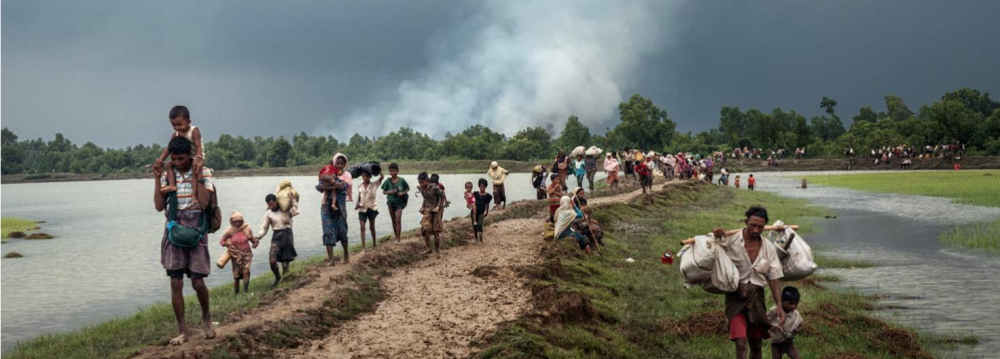Amnesty International has gathered extensive, credible evidence implicating Myanmar's military Commander-in-Chief, Senior General Min Aung Hlaing, and 12 other named individuals in crimes against humanity committed during the ethnic cleansing of the Rohingya population in northern Rakhine State.
The comprehensive report, "We Will Destroy Everything": Military Responsibility for Crimes against Humanity in Rakhine State, Myanmar, calls for the situation in Myanmar to be referred to the International Criminal Court for investigation and prosecution, Amnesty International reported through its website.
"The explosion of violence—including murder, rape, torture, burning and forced starvation—perpetrated by Myanmar's security forces in villages across northern Rakhine State was not the action of rogue soldiers or units. There is a mountain of evidence that this was part of a highly orchestrated, systematic attack on the Rohingya population," said Matthew Wells, Senior Crisis Adviser at Amnesty International.
"Those with blood on their hands—right up the chain of command to Senior General Min Aung Hlaing—must be held to account for their role in overseeing or carrying out crimes against humanity and other serious human rights violations under international law."
>Comprehensive Account
In the report, Amnesty International also names nine of the commander-in-chief's subordinates in the TatmadawMyanmar's armed forces—and three in the Border Guard Police for their roles in the ethnic cleansing campaign.
The culmination of nine months of intensive research, including in Myanmar and Bangladesh, the report is Amnesty International's most comprehensive account yet of how the Myanmar military forced more than 702,000 women, men and children—more than 80% of northern Rakhine State's Rohingya population when the crisis started—to flee to Bangladesh after August 25, 2017.
The report provides new details about the Myanmar military's command structure and troop deployments, as well as the security forces' arrests, enforced disappearances and torture of Rohingya men and boys in the weeks directly before the current crisis unfolded.
It also provides the most detailed information to date about abuses by the armed group the Arakan Rohingya Salvation Army (ARSA), before and after it launched coordinated attacks on security posts on August 25, 2017. This includes killings of people from different ethnic and religious communities in northern Rakhine State, as well as the targeted killings and abductions of suspected Rohingya informants to the authorities.
Amnesty International has already documented in detail how the Myanmar military's vicious response to the ARSA attacks came in the context of long-standing institutionalized discrimination and segregation amounting to apartheid and was marked by crimes under international law including murder, rape, torture, targeted large-scale burning of villages, the use of landmines, forced starvation, mass deportation and other serious human rights violations.
>Disastrous Decisions
The report documents how the military's senior command put some of its fiercest fighting battalions, infamous for violations elsewhere in the country, front and center in the operations in northern Rakhine State. This had disastrous consequences for the Rohingya population.
In the weeks leading up to August 25, the Tatmadaw brought in battalions from the 33rd and 99th Light Infantry Divisions (LIDs), two combat divisions that Amnesty International had implicated in war crimes in Kachin and northern Shan State in late 2016 and mid-2017, as part of the ongoing internal armed conflicts there.
In some Rohingya villages, the incoming military commanders made their intentions clear from the start. Around August 20, 2017, five days before the bulk of the violence erupted, a field commander from the 33rd LID met in Chut Pyin, Rathedaung Township, with Rohingya leaders from nearby villages. According to seven people present interviewed separately by Amnesty International, the field commander threatened that if there was ARSA activity in the area, or if villagers did any "wrong", his soldiers would shoot at the Rohingya directly, without any distinction.
Amnesty International likewise obtained an audio recording in Burmese, which it believes to be authentic, of a telephone call between a Rohingya resident of Inn Din, Maungdaw Township, and a Myanmar military officer based in the area. In the recording, the officer says, "We got an order to burn down the entire village if there is any disturbance. If you villagers aren't living peacefully, we will destroy everything."
The security forces also raped Rohingya women and girls, both in their villages and as they fled to Bangladesh. Amnesty International interviewed 20 women and two girls who were survivors of rape, 11 of whom were gang raped.
The organization documented rape and sexual violence in 16 different locations in all three townships of northern Rakhine State. The practice was widespread and terrorized Rohingya communities, contributing to the campaign to force them out of northern Rakhine State. Some rape victims also had their family members killed in front of them. In at least one village, security forces left rape survivors inside buildings and set them on fire.


